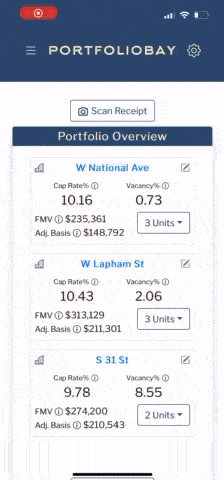Managing rental properties is no different from running a small business, and it’s crucial to get the bookkeeping and accounting processes right, especially for self-managing landlords. The minimum bookkeeping standards should meet the IRS bookkeeping requirements for compliance. In addition to being compliant, we should also setup our system in a way that’s efficient for us to handle all the tedious accounting tasks.
Keep your receipts!
Per IRS standards, all expense receipts over $75 should be retained for audit purposes. Many landlords make the mistake of believing bank statements could be used as proof and put themselves at risk of a failed audit. On your bank statement, when you’ve made a purchase at Home Depot, for example, the entry only shows the amount and the vendor, not enough to prove the actual purpose or nature of the purchase. Just for what’s possible, someone could have bought a $300 Starbucks gift card from Home Depot and put it as a rental expense, which is absolutely not okay. That is why IRS would require you to keep all expense receipts over $75 as supporting documents.
Don’t sync bank expenses and categorize them later
There are rental management tools that claim to save you time by monitoring your bank expenses, and either automatically or manually categorizing them later. The truth is that such an approach does not meet the minimum compliance standard without you saving or uploading the receipts. Syncing bank accounts for expenses is just a fancier way of pulling a bank statement. If the landlord needs to keep the receipts themself or upload them later, such tools will not save a significant amount of time for self-managing landlords.
Receipts first, then categorize
Instead of focusing on monitoring bank accounts and categorizing them, it’s better to focus on making receipt capture as streamlined as possible, then, do the categorization as part of receipt upload.
Modern smartphones are usually equipped with capable cameras and decent processing power, so, with some clever algorithm, it’s definitely capable of becoming a mobile receipt scanner for self-managing landlords to make receipt capture and accounting super easy.
PortfolioBay, a web app used by self-managing landlords, has features built exactly for such kind of use case. It makes receipt capturing, compliance, and account super easy.

In addition to capture the receipt image, PortfolioBay can also automatically extracts the receipt information and makes them searchable. So, even without manual annotation and labeling, searching for a past expense is a breeze.
Processes over tools for self-managing landlords
Whether you use generic tools like excel and dropbox or specialized landlord software like PortfolioBay, it’s important to focus on your bookkeeping process first. By having a process to easily and reliably capture all expense receipts, you will save a lot of time, understand your portfolio better, and sleep better at night.



